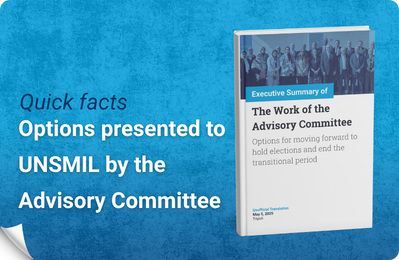Prior to July 2014, UNSMIL’s Security Institutions Division (SID), formally the Security Sector Advisory and Coordinating Division (SSACD), worked extensively in Libya’s security sector supporting the development of national security architectures and capacity building particularly in the areas of police, defense, arms and ammunition management and border management. These efforts built high levels of trust with many Libyan security actors (including armed groups) which has provided ongoing credibility, networks and entry point for UNSMIL’s current endeavors.
Following the events of 2014 and new United Nations Security Council Resolutions (most recently UNSCR 2323 of December 2016), SID now supports the implementation of the Libyan Political Agreement (LPA), the Government of National Accord (GNA) and is particularly responsible for assistance to Libyan security arrangements through its key security institutions; mediation between both state and non-state actors, securing of uncontrolled arms and related materiel and countering their proliferation; and for maximizing the coordination of international responses and support to the security sector.
Despite political, security and logistic challenges, the Security Institutions Division has remained engaged since 2014 and has progressively strengthened its efforts to assist Libya to end the armed conflict in Libya; stabilize security; peacefully resolve differences between both state and non-state forces; encourage armed groups to support the political process; mediate ceasefires and humanitarian safe corridors; and empower and rebuild capacity in the police, army and other legitimate security forces.
With the direct support of UNMAS, UNSMIL has continued to assist Libya in reducing the threat of improvised explosive devices and proliferation of small arms, light weapons and ammunition through training and rallying international funding/assistance. With the help of a European Union planning cell, SID provides significant support to Libya’s security planning and decision making (including development of state forces) and efforts to navigate the UN arms embargo and associated exemptions processes;. SID also provides substantial contributions to UN and international community understanding of the complex security dynamics.
SID’s efforts have been underpinned by ongoing credibility in both Libya and internationally, its broad range of security sector expertise, its long-standing networks and by the application of the fundamental principle of national ownership.
 United Nations Peacekeeping
United Nations Peacekeeping UN
UN



